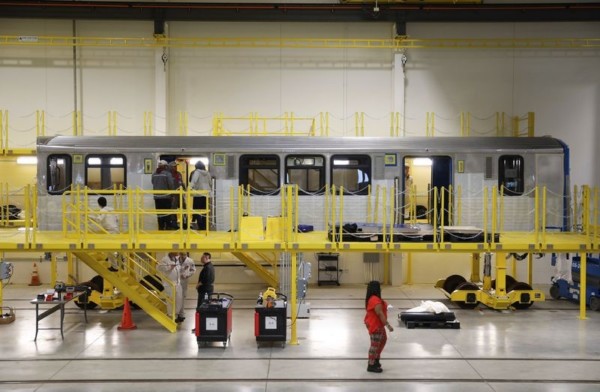The Editorial Board | Chicago Tribune
When the Chicago Transit Authority awarded a contract for 800 new rail cars to CRRC Sifang in 2016, it looked like a good deal for everyone. The agency would get spiffy modern rolling stock to replace much of its aging fleet, at a savings of $226 million compared with the competing bid. The Far Southeast Side would get a new factory to build the Chinese rail cars, employing 169 people.
Mayor Rahm Emanuel took great pride in the deal. “It’s one thing to order new cars and the customers will get a great experience,” he said. “It’s another thing to order those cars and create great manufacturing jobs in the city of Chicago and bring back rail car manufacturing to its proper home.” Union workers at the plant start out making $55,000 a year and average about $77,000. The plant has also generated business for 14 different suppliers in Illinois.
But the operation is now in peril because of paranoia and protectionism. Both the U.S. House and Senate have voted to forbid transit agencies from using federal funds to purchase Chinese rail cars, though they still have to work out differences in their bills. The existing CTA contract wouldn’t be affected, but Metra would lose the option of getting the 200 rail cars it wants to buy from a local manufacturer.

Photo taken by Abel Uribe, Chicago Tribune
Any chance the Hegewisch plant could expand to build equipment for agencies in other cities would also be gone. Eventually, we can expect, it would have to shut down for lack of business.
Critics fear the company, owned by the Chinese government, could someday put American companies out of business. As it happens, there are no domestic rail car producers for it to compete with. But alarmists fear that CRRC, with unfair help from Beijing, will eventually want to build freight cars in the U.S., taking sales from existing domestic producers.
The critics also fantasize that the Chinese company could incorporate technology to spy on Americans or sabotage transit systems. Said Sen. John Cornyn, R-Texas, “China poses a clear and present danger to our national security and has already infiltrated our rail and bus manufacturing industries.”
If by “infiltrated” he means that Chinese firms have built factories and won contracts for rail cars and buses, he’s right. But what’s wrong with that? Foreign investment is good for the U.S. economy and American workers. Transit agencies benefit from having more choices.
Any threat to the privacy of Americans is far more likely to come from their Chinese-made smartphones, computers and other electronics. Before the rail cars are delivered, they are subject to thorough inspection by the purchasers. Afterward, they come under the control of transit agencies, not the Chinese government.
As for any potential illegitimate business practices on the part of Beijing, there are better safeguards. “The U.S. already has ample tools to address issues of unfair competition through antitrust, countervailing duties and other policies,” Scott Kennedy,an economist at the Center for Strategic and International Studies in Washington, tells us.
The Rail Security Alliance, representing U.S. makers of freight cars, sees a danger if CRRC were to compete in that business. It’s hard to see any security threat there, either. Besides, the company says it has no plans to manufacture freight cars in the U.S. Should it change course, there will be plenty of time to address any possible concerns the decision would raise.
If the legislation becomes law, it will cost American jobs and needlessly raise the cost of mass transit. It deserves to be left at the station.
Source: Chicago Tribune